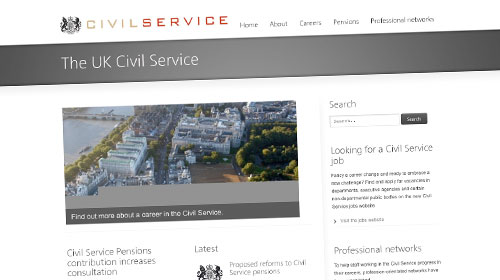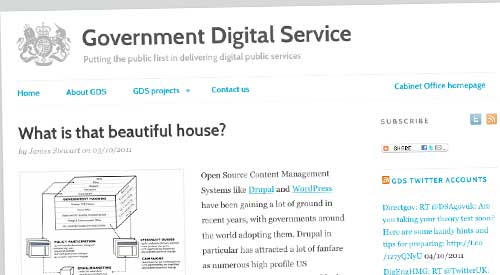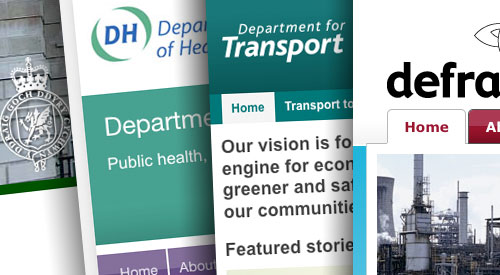In addition to the five Government Digital Service product manager roles I mentioned at the end of last week, I’ve also had my attention drawn to several other roles being advertised on the Civil Service jobs website:
- Two creative leads (eh?), with salary package up to £80k
- Two technical architects, £90k
- 12 developer positions, with salary quoted at ‘up to £65k’
- Two ‘web ops’ (I’m not even sure what that means – guess I’m not suitable), £65k
- A delivery team manager, £85k
- Three interaction designers, £59k
All the above positions are based in Central London, are ‘open to UK, British Commonwealth and European Economic Area (EEA) Nationals and certain non EEA members’, and are offered on a Fixed Term basis. The closing date for all positions is 4 November.
Potentially totalling £1.5 million (and that’s without overheads, NI, etc), those look like very generous salaries indeed, particularly in an economic downturn. They’ve clearly set their sights very highly indeed: justifiable, arguably, given the importance of the positions, and the (net) savings they’re meant to generate.
Additionally, they’re advertising for the SCS1-level position of Deputy Director Digital Engagement: a permanent position this time, with salary in the range £58,200 – £72,000 – ‘with an expectation of joining at the lower end of the payscale’ , which seems slightly odd given the other positions on offer at the same time. Closing date on that one is 8 November.
There’s plenty of detail in the ‘person specification’ for the role, listing among its responsibilities:
- Managing the use of social media within government, focusing on standards, acceptable use and engagement.
- Engaging with other business units within Cabinet Office to assist in the delivery of key initiatives using digital channels to ensure that the GDS agenda is at the heart of government policy and execution.
- Defining the GDS communication approaches as an exemplar of best practice in digital communication
- Encouraging the maximum use of digital channels to access government information and transactions.
- Designing and implementing the organisational development programme that will embed the Digital by Default mission
- Actively promoting concepts of open governance through promoting the use of open government data, engaging actively with third party developers in conjunction with the partnership team
- Establishing an approach to managing reputation risk across the digital domain with appropriate ownership by individual departments
- Being the media spokesperson for GDS
But I’m having trouble confirming the position of this position in the GDS hierarchy. It reads like it’s a direct report to executive director Mike Bracken, but that isn’t made clear. (The paperwork attached to the job ad calls it ‘Deputy Director, Digital Engagement’ with a potentially all-important comma.) For the record, the last time we saw the words ‘director’, ‘digital’ and ‘engagement’ together, it was Katie Davis taking over from Andrew Stott on an interim basis… but she moved to DH in July.
I’d link to the various job adverts on the new Civil Service Jobs website … but it won’t let me. For some ridiculous reason, they’ve made the form submit via POST, not GET… so you don’t get any identifying data in the URL displayed by the browser. You’ll have to go here, and search for ‘Cabinet Office excl agencies’ positions.






